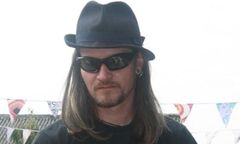Mark Kennedy
 Working undercover as an environmental activist | |
| Born | 7 July 1969 |
Mark Kennedy, undercover name Mark Stone, is a former London Metropolitan Police officer who, whilst attached to the police service's National Public Order Intelligence Unit, (NPOIU) infiltrated many protest groups between 2003 and 2010 before he was unmasked by political activists as an undercover policeman on 21 October 2010 and his identity was confirmed by the media three days later.
Contents
IPT ruling
Kate Wilson, one of the women who had sued the police in the High Court, started a case in 2018 at the Investigatory Powers Tribunal, alleging the police had infringed her human rights in five ways. In court documents, the police admitted that Kennedy's line manager and other officers were aware of the sexual relationship, stating "sexual relationship with Wilson was carried out with the acquiescence of his cover officers and line manager". Previously the police had suggested such relationships were not officially sanctioned.
The Met tried to claim that engaging in a sexual relationship while deployed would be a breach of professional conduct, but the IPT ruling states that this argument is “materially undermined by the sheer frequency with which Mark Kennedy (and other undercover officers) did conduct sexual relationships without either questions being asked or action being taken by senior officers”.[1]
Environmental activist
In a Channel 4 interview broadcast on 14 November 2011, Kennedy stated that, in the guise of an environmental activist, he was used by the police forces of 22 countries and was responsible for the closing down of the Youth House community centre in Copenhagen.
Kennedy said he was hired by German police between 2004 and 2009 and allegedly committed two crimes on their behalf, one of which was arson. German MP Andrej Hunko raised questions in the German Bundestag concerning what the German authorities knew about Kennedy's activities amongst the Berlin protest movement. Kennedy had been arrested in Berlin for attempted arson but was never brought to trial. Hunko also asked: "How does the federal government justify the fact that Mark Kennedy, as part of his operation in Germany, did not only initiate long-term meaningful friendships but also sexual relationships, clearly under false pretenses?" The federal government refused to answer all questions relating to Kennedy.
In February 2010, while still serving as a police officer, he set up Tokra Ltd, a private company at the same address as a security firm that works for the energy company E.ON, the owners of Ratcliffe-on-Soar Power Station.[2]
Ratcliffe Power Station trial
The case against six activists accused of conspiracy to commit aggravated trespass at Ratcliffe-on-Soar Power Station collapsed following the revelation of Kennedy's activities as an undercover policeman.
Danny Chivers, who was one of the six successful defendants in the case, said Kennedy was not just an observer, but an agent provocateur:
- "We're not talking about someone sitting at the back of the meeting taking notes - he was in the thick of it."
In a taped conversation obtained by BBC Newsnight and broadcast on 10 January 2011, Kennedy told an activist he was "sorry" and "wanted to make amends". Kennedy admitted he had been a serving police officer at the time of the Ratcliffe arrests, but said he was not one now. He also told the activist:
- "I hate myself so much I betrayed so many people...I owe it to a lot of good people to do something right for a change ... I'm really sorry."[3]
CPS withholds evidence
Crown Prosecution Service (CPS) barrister Felicity Gerry was forced to withdraw the case against the activists after Kennedy confessed to the set-up, evidence of which the CPS had withheld from the defence. The CPS also withheld the fact that Kennedy was giving testimony under the false name Mark Stone using a false passport supplied by the police. Secret tapes recorded by Kennedy were also withheld by the CPS. The Guardian reported that "Kennedy's tapes were secret evidence that could have exonerated six activists, known as the "deniers" because they claimed not to have agreed to join the protest" and "evidence gathered by the Guardian now suggests it was the Crown Prosecution Service rather than the police that withheld the tapes". CPS lawyer Ian Cunningham faced dismissal after a report by Sir Christopher Rose criticised Cunningham for failing to ask questions about Kennedy's involvement in the Ratcliffe plot.[4]
Related Document
| Title | Type | Publication date | Author(s) | Description |
|---|---|---|---|---|
| Document:Police Violence | Article | 1 October 2021 | Mike Small | The radical overhaul of how we view policing and law and order shouldn’t be contained within the prism of the appalling problem of male violence – but seen in the context of state violence, the repression of dissent and the growth of the surveillance state. |